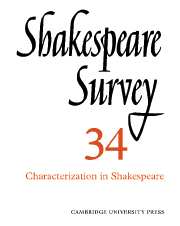Book contents
- Frontmatter
- Shakespeare’s Open Secret
- The Emergence of Character Criticism, 1774–1800
- Society and the Individual in Shakespeare’s Conception of Character
- Realistic Convention and Conventional Realism in Shakespeare
- On Expectation and Surprise: Shakespeare’s Construction of Character
- Shakespeare and the Ventriloquists
- The Rhetoric of Character Construction: Othello
- Characterizing Coriolanus
- The Ironic Reading of The Rape of Lucrece and the Problem of External Evidence
- The Unity of Romeo and Juliet
- No Abuse: The Prince and Falstaff in the Tavern Scenes of Henry IV
- Twelfth Night: The Experience of the Audience
- Plays and Playing in Twelfth Night
- Sceptical Visions: Shakespeare’s Tragedies and Jonson’s Comedies
- Shakespeare in Performance, 1980
- The Year's Contributions to Shakespearian Study 1 Critical Studies
- 2 Shakespeare’s Life, Times and Stage
- 3 Textual Studies
- Index
- Plate Section
The Year's Contributions to Shakespearian Study 1 - Critical Studies
Published online by Cambridge University Press: 28 March 2007
- Frontmatter
- Shakespeare’s Open Secret
- The Emergence of Character Criticism, 1774–1800
- Society and the Individual in Shakespeare’s Conception of Character
- Realistic Convention and Conventional Realism in Shakespeare
- On Expectation and Surprise: Shakespeare’s Construction of Character
- Shakespeare and the Ventriloquists
- The Rhetoric of Character Construction: Othello
- Characterizing Coriolanus
- The Ironic Reading of The Rape of Lucrece and the Problem of External Evidence
- The Unity of Romeo and Juliet
- No Abuse: The Prince and Falstaff in the Tavern Scenes of Henry IV
- Twelfth Night: The Experience of the Audience
- Plays and Playing in Twelfth Night
- Sceptical Visions: Shakespeare’s Tragedies and Jonson’s Comedies
- Shakespeare in Performance, 1980
- The Year's Contributions to Shakespearian Study 1 Critical Studies
- 2 Shakespeare’s Life, Times and Stage
- 3 Textual Studies
- Index
- Plate Section
Summary
BOOKS AND COUNTERBOOKS
‘A book which does not contain its counterbook is considered incomplete’, wrote Borges, describing the books of ‘Tlön’ which invariably include ‘the rigorous pro and con of a doctrine’. This also seems a strikingly accurate account of Shakespeare’s plays and poems. Possibly because his strongest case in favour of something is, characteristically, countered by the best possible arguments against it – and vice versa – Shakespeare often seems to confront us with the very books and counterbooks of life itself. This, of course, has provided critics with countless subjects for fruitful speculation. But it poses grave difficulties for those who attempt to interpret his works in terms of a single doctrine or one-sided theory. And there is always the danger of mistaking a counter-argument for the main one. Several recently published books, as well as certain articles which will be considered later on, may serve to illustrate these points.
- Type
- Chapter
- Information
- Shakespeare Survey , pp. 161 - 177Publisher: Cambridge University PressPrint publication year: 1982

